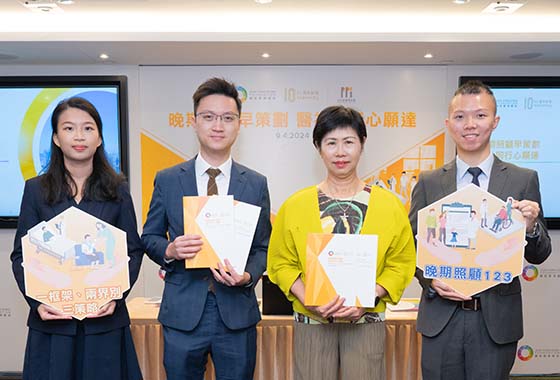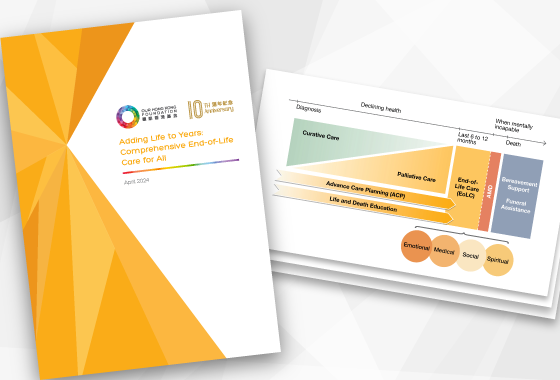The First Landscape Study of Gerontechnology in Hong Kong
Five key challenges identified
Huge business opportunities yet to be tapped
In recent years, the Government has been actively promoting technological innovation as a means to meeting the challenges of our ageing population. Gerontechnology - technology directed towards elderly-related products and services - will enhance the quality of life and self-reliance of the elderly, support the carers, as well as open up vast business opportunities in the silver hair market.
Against this background, the Social Innovation and Entrepreneurship Development Fund (SIE Fund) earlier on commissioned the Hong Kong Council of Social Service (HKCSS) to conduct the first-ever Landscape Study on Gerontechnology in the city. The study seeks to collect the views of stakeholders on the subject, enhance their understanding of gerontechnology, and stimulate thoughts as to how to make use of innovation and technology to meet the current and future demand for elderly care as well as how to promote the development of gerontechnology in such areas as research and development, policies, infrastructure, etc, and tap the new opportunities.

Prof Stephen Cheung Yan-leung, Chairperson of the Social Innovation and Entrepreneurship Development Fund Task Force;
and Mr Chua Hoi Wai, Chief Executive of the Hong Kong Council of Social Service.
Statistics show that by 2040 approximately 30% of the local population will be aged 65 and over, and they will be better educated and wealthier than those currently in the same demographic group. In 2016, only 25% of the local population aged 60 or above had received senior secondary or tertiary education, while the corresponding figures were 51% for those aged 50-59, and 67% for those aged 40-49. The latter two groups will enter their golden age in 10 to 20 years respectively. The future ageing population is expected to seek a more self-reliant and qualify living after retirement. According to the Ageing Asia Silver Economy Index 2015 cited by the study, Hong Kong was ranked second in the Asia-Pacific Region in term of spending power of the ageing population and their children. These statistics point to the huge market potential of gerontechnology in Hong Kong.
Conducted by Our Hong Kong Foundation (OHKF) in partnership with HKCSS, the study focused on four areas, namely Living, Healthcare, Diet, and Transport and looked into 72 products and services with the potential of widespread use in Hong Kong. Among them, 56 were being used in Hong Kong and most were locally developed, including a virtual reality (VR)-based rehabilitation system for cognitive-impaired patients, an automatic shower machine, a smart RFID walking cane, etc.

Janley Limited demonstrate a Stair Climber.

The study also identified the difficulties faced by the local gerontechnology sector. Among others, the five major challenges are:
1) A lack of understanding about gerontechnology, with gerontechnology products seen as supplementary rather than core to elderly care;
2) A lack of collaboration among stakeholders. For example, cooperation among universities, research institutes, NGOs and government departments is rare;
3) Startups fall victim to the “Valley of Death” as a lack of funding often hinders applied research or commercialisation of their products;
4) Products that are well received overseas do not enjoy the same popularity in Hong Kong due to cultural differences and the small market size; and
5) A lack of test beds for new gerontechnology products.
“Compared with other countries and regions, the development of gerontechnology in Hong Kong is still at an initial stage. The gerontechnology landscape study is crucial because it provides an extensive examination of the subject, something that has been lacking in Hong Kong. This study has successfully highlighted the opportunities, challenges, advantages and gaps for the gerontechnology sector. I hope the study will provide stakeholders with a fuller understanding of the development and application of gerontechnology, as well as spark off cross-sector collaborations that can help different sectors tap new opportunities and address the demand,” said Professor Stephen Cheung Yan-leung, Chairperson of SIE Fund Task Force.
“Products and services derived from gerontechnology can enhance the living quality of the elderly and relieve the pressure of their carers. For service providers like elderly homes, gerontechnology helps improve service quality and efficiency, mitigate manpower shortage, and enhance occupational safety. We will collaborate with different stakeholders and service users in promoting the development of gerontechnology,” said Mr Chua Hoi Wai, Chief Executive of HKCSS.
“Stakeholders should work together to turn challenges facing the sector into opportunities. It will encourage innovations for our city and help brilliant ideas thrive while bringing a pleasant living to the elderly in their later years,” said Mr Stephen Wong, Deputy Executive Director and Head of Public Policy Institute of OHKF.

Ms Elsa Hung, SIE Fund Task Force Secretariat; Prof Stephen Cheung Yan-leung, Chairperson of SIE Fund Task Force;
Mr Chua Hoi Wai, Chief Executive of the Hong Kong Council of Social Service; Mr Stephen Wong, Deputy Executive Director
and Head of Public Policy Institute of Our Hong Kong Foundation; Mr Kenny Shui, Senior Researcher of Our Hong Kong Foundation;
and Ms Yeung Wai-lan, Service Manager of St. James' Settlement Central and Western District Elderly Community Center



